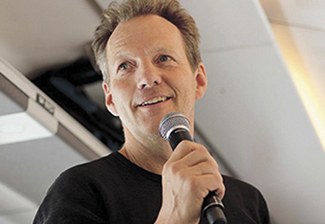
The StartupLab – a unique Norwegian experience Interview with Rolf Assev, co-founder StartupLab
Rolf is a dynamic and clever man, positive and a doer. Since his student days at the Norwegian School of Economics in Bergen, Rolf has been one of the leaders in whatever he takes on. In Norway he is an expert on entrepreneurship, and we see him often in the media. His list of achievements is long, but let us briefly mention that Rolf’s role in the Opera Software as Executive Vice President Sales and Marketing, Chief Commercial Officer and Chief Strategy contributed to the building of the company from 12 to 750 people with more than 200 million active users. Today he is in front encouraging young people to take on the entrepreneurial path, so let us give the floor to Rolf.
Q: You are one of Norway’s experts on entrepreneurship. How did you get the idea to create the StartupLab?
The original idea for StartupLab was initiated by Karl Christian Agerup, former co-founder of Nothzone venture, and Alexander Woxen. The idea was simple: invite experienced technical founders to work with new founders in a technical environment. The vision was to make new global tech companies out of Norway with a clear philosophy, Founders First.
I came in as a co-founder of a new startup, DragonBox, that we started after my 12 years in Opera Software. After some months I started working full time for StartupLab.
Ten years ago, few people thought it was possible to build successful tech companies in Norway. It was reserved for Sweden, and perhaps Finland. However, we had a small number of international successful companies such as Opera Software, Fast, Trolltech, Chipcon, Energy Micro, Point Carbon, Mamut and Tandberg.
Many of the tech entrepreneurs behind these companies had made a lot of money. Some of them had made really really a lot of money. Few of them wanted to use it to buy an island in the Caribbean or play golf in Spain. The entrepreneurial gene does not go out even if the bank account grows. The willingness and desire to reinvest some of the money they had earned was great, but the opportunities were few.
This is where StartupLab’s vision met the needs of entrepreneurial money. We invited one by one the successful, extremely rich entrepreneurs to a coffee chat with the theme, « Shall we together create an environment where high-tech entrepreneurs help tech entrepreneurs? »
The first coffee was with Jon von Tetzchner, who had just sold out of Opera Software. Ten minutes and a handshake later, he had committed himself to contribute with five million kroner and his entire network. All subsequent coffee cups gave similarly positive results. They all knew they might never see their money again, but they would still give back and build new tech companies.
StartupLab became a melting pot for tomorrow’s tech entrepreneurs. Companies such as Remarkable, Huddly and No Isolation made their first prototypes and found their first investors in the lab. Even more important than money: they found other experienced entrepreneurs with networks and expertise.
Since then, Norway has fostered a number of successful tech startups – both in StartupLab and in the many other new startup environments that have been established such as MESH, 657 and Antler, just to name a few in Oslo. In Trondheim, Stavanger and Bergen, separate environments emerged. Even on the islands in the western part of Norway where the traditional family businesses prevail, new exciting environments where experienced entrepreneurs got involved in starting new companies were set up.
The results are absolutely fantastic. Tibber fetched 590 million NOK, Spacemakers sold for 2.2 billion NOK, Meltwater fetched 3.5 billion NOK and Kahoot fetched 2.8 billion NOK. Just to name a few. And the cycle will repeat itself: Just as formerly successful entrepreneurs became the soil of today’s entrepreneurial fever; today’s entrepreneurs will become the soil in which tomorrow’s business will grow. Not as a wave, but as an exponential curve.
Another crucial factor permitting us to create a start-up culture in Norway, where the values created can to a greater extent be ploughed back into new start-ups, is the Merkur Market or as it’s called now Euronext Growth. [Editor’s note: It is an equity trading market that was opened May 17, 2005, by its parent institution Euronext to address an opportunity presented by small- to medium-sized firms that were expected to need easier access to an equity market.]
Traditionally, Norwegian tech companies have been sold to international companies far too soon. The Mercur Market has become an important tool for financing them for international growth and with the secure competence building and jobs in Norway.
In StartupLab, we have the enormous pleasure of being able to draw on expertise and networks for the new generation of tech entrepreneurs. There are many who want to contribute money, expertise and networks. The value of having serial entrepreneurs in StartupLab is enormous. The companies in StartupLab alone have created more than 3,000 new jobs.
Don’t get me wrong: building international tech startups is difficult, and most people fail. Entrepreneurs will lose their jobs, and investors will lose money. Nevertheless, I believe that Norway has never been better positioned as a startup country. We have the soil that is constantly being replenished, and we have a stock exchange tool for early-stage companies we have not had before.
 Q : How does the StartupLab work, and what kind of assistance do you provide?
Q : How does the StartupLab work, and what kind of assistance do you provide?
We have at any time 100 technical startups in our offices. Every week we have one Startup moving in, and one startup is growing out. Unfortunately, we have capacity to accept only one out of ten applications, hence we are able to attract the best of the best startups.
We work closely with the startups over months, and after 4-6 months we offer investments into 30 % of the startups. At this stage, the founders know us and know what they can expect, and we know the founders and see that they are able to execute. It is like living together before you get married.
Q: In 2020, you received the NHH (Norwegian School of Economics and Business Administration) Almuni Prize for your outstanding achievements. Did it change anything for you, particularly in the orientation of your efforts?
This came after a very special year for me durng which I had spent most of the time in hospital recovering from a severe stroke, so this meant a lot to me and made me want to get back to supporting new founders in building the new industry that will take over after oil and gas. Working with founders that want to change the world is giving me energy and hope.
Q: Talking about success stories, how many companies have you set up, and how many new jobs have you created through the StartupLab?
Since the start of StartupLab we have supported 350 startups and invested in 110 of these. These startups have created 3,500 new jobs, and this is just the beginning.
Q: In today’s pandemic times, the ILO and other United Nations agencies are concerned about the pandemic’s economic consequences, especially for the youth and their access to the job market. Is your version of entrepreneurship part of the solution? If so, what does it have to offer young people in particular?
Yes, creating new jobs by supporting the entrepreneurial spirit is for sure a major part of the solution. I call this new generation “The Generation Å” as this is the final generation that can save the world. And the good part: I believe they will.
Q: It’s tough to set up a business. What kind of advice would you give to young people?
Do not be afraid of failing. Starting a startup requires full dedication and focus, and chances of failure are big. But it also involves an impressive learning experience and a lot of fun. Do it before you are too old and risk averse.
Q: Many countries around the world are looking at ways to encourage entrepreneurship. What advice would you offer them generally, and, particularly, if you can cite one or more specific country?
Make it simple to attract talent from all over the world. To build global successful startups you need to think diversity from day one and hire talent from all over the world.
Q: Finally, Mr. Assev, would you be willing to share your experience with others? If so, how can people contact you?
In StartupLab we support Norwegian only startups, but if you are considering building a startup in Norway – and there are many good reasons to do that – you can contact me at rolf@startuplab.no .





